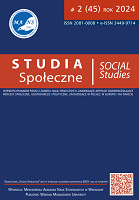ZASTOSOWANIE ODPOWIEDNIKÓW SŁOWNYCH KONIUNKCJI, ALTERNATYW I DYSJUNKCJI W PRAWIE KARNYM MATERIALNYM. CZY DYREKTYWA JĘZYKA POWSZECHNEGO POZWALA NA ODSTĄPIENIE OD ICH ZNACZENIA PRZYJĘTEGO W LOGICE PRAWNICZEJ?
THE USE OF THE VERBAL EQUIVALENTS OF CONJUNCTION, ALTERNATIVE AND DISJUNCTION IN SUBSTANTIVE CRIMINAL LAW. DOES THE COMMON LANGUAGE DIRECTIVE ALLOW A DEPART FROM THEIR MEANING ACCEPTED IN LEGAL LOGIC?
Author(s): Tomasz Tyburcy, Weronika WęgorzewskaSubject(s): Criminal Law, Sociolinguistics, Sociology of Law, Stylistics, Court case
Published by: Wydawnictwo im. Prof. L.J. Krzyżanowskiego WSM w Warszawie
Keywords: legal logic; substantive criminal law; linguistic interpretation; conjunctions; truth functors; conjunctions of alternatives; disjunction; conjunction;
Summary/Abstract: The purpose of this article is to prove that the lawmaker does not necessarily consciously, and therefore also inconsistently in the process of lawmaking, use conjunctions in their meaning accepted by legal logic. The article analyzes the legal rules in which correctly, as well as incorrectly, the legislator used conjunctions of alternatives, disjunctions and conjunction in the Criminal Code. A formal-dogmatic method was used, as well as an analytical method to demonstrate the thesis put forward, which is that it is sometimes necessary to refer to the directive of the common language in order not to derive absurd norms from the provisions in the process of their interpretation. The considerations referred to the rules in force in this regard expressed in the “Principles of Legislative Techniques”, as well as to the jurisprudence of the courts in cases of legal rules whose interpretation is controversial or disputed in the doctrine and judicature. The conclusions of the study confi rm the thesis. Thus, it is sometimes necessary to prioritize the directive of the common language over the directive of understanding the verbal equivalents of truth functors according to their understanding on the basis of logic.
Journal: Studia Społeczne
- Issue Year: 45/2024
- Issue No: 2
- Page Range: 151-169
- Page Count: 19
- Language: Polish

